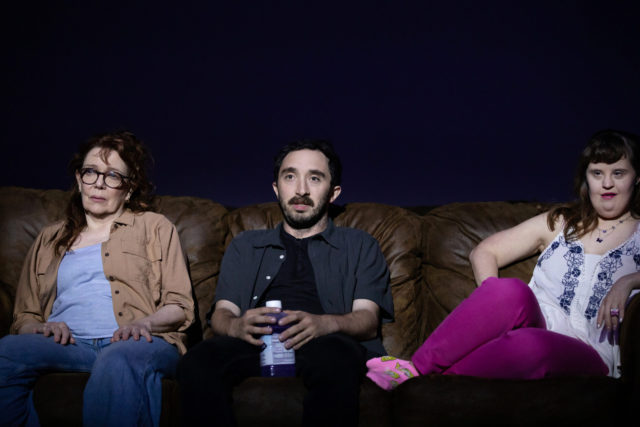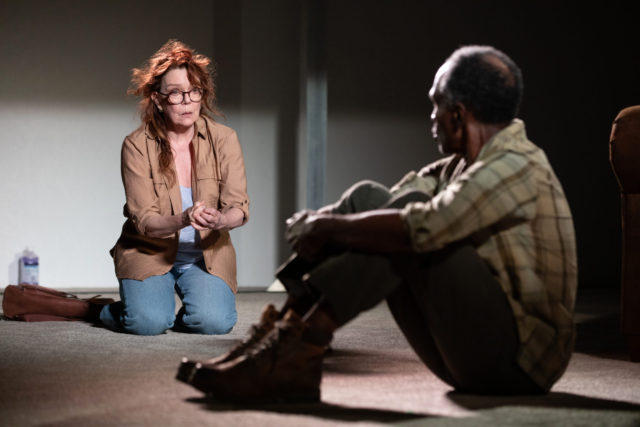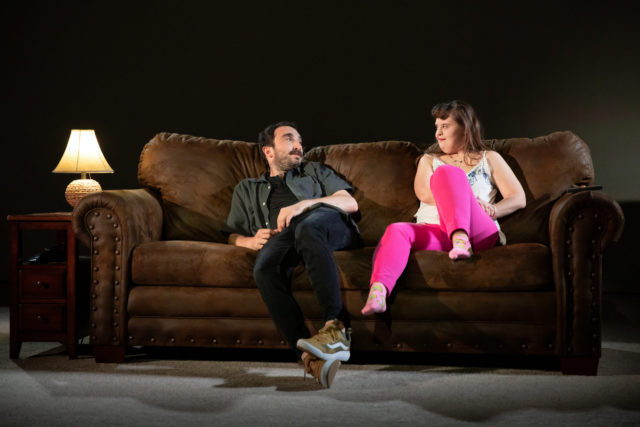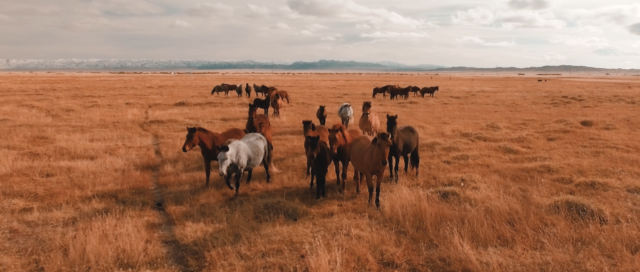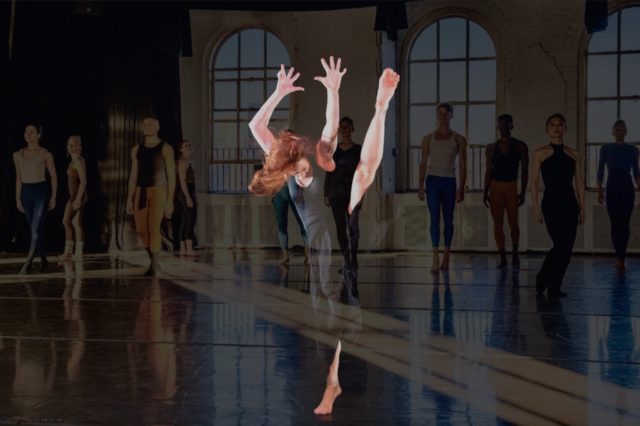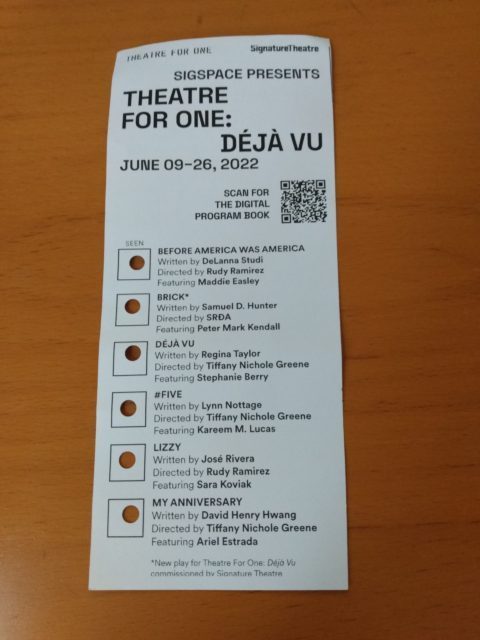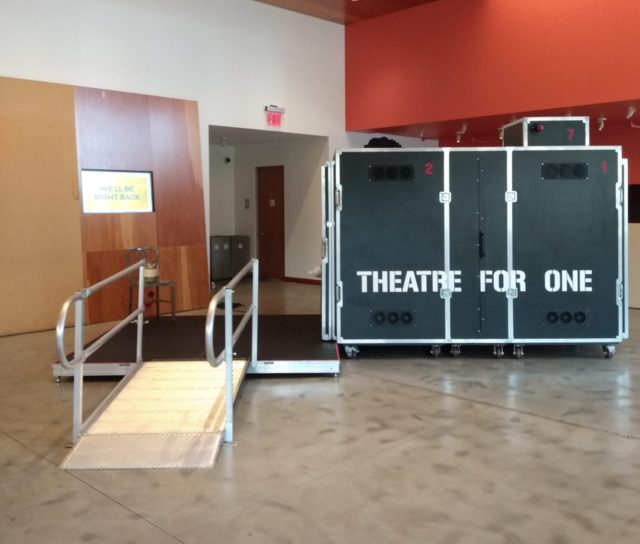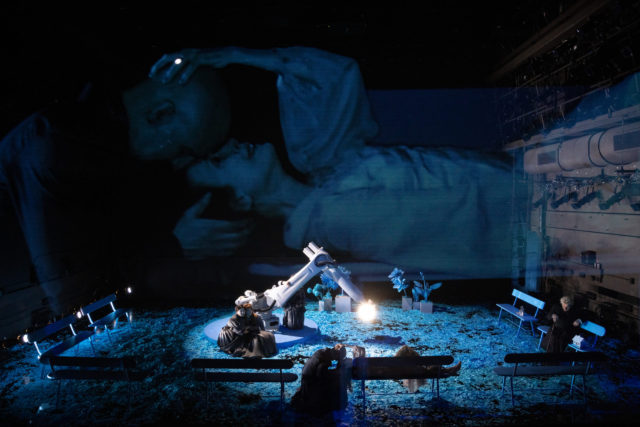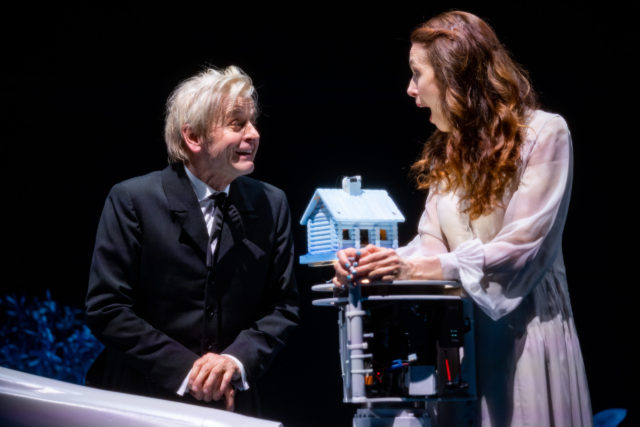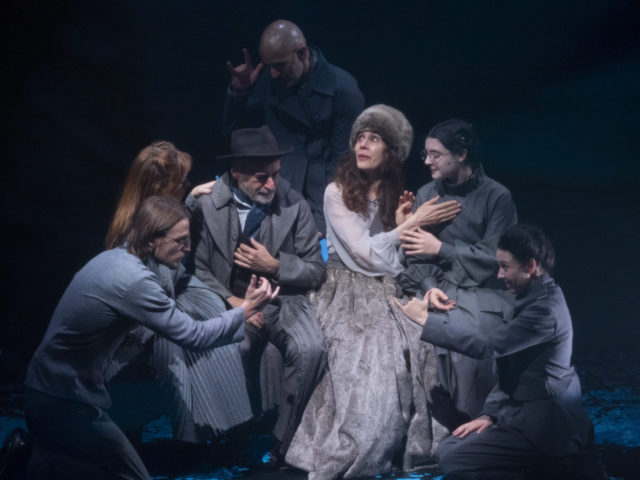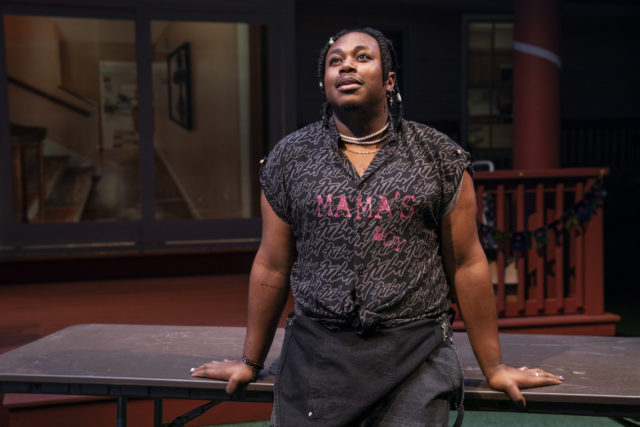
Marcel Spears stars as a different kind of Hamlet in James Ijames’s Pulitzer-winning Fat Ham (photo by Joan Marcus)
FAT HAM
Anspacher Theater, the Public Theater
425 Lafayette St. at Astor Pl.
Tuesday through Sunday through July 31, $50-$80
212-539-8500
publictheater.org
There’s no “To be or not to be” in James Ijames’s rousing, spirited adaptation of one of William Shakespeare’s most famous tragedies, Hamlet. In the Pulitzer Prize–winning Fat Ham, continuing at the Public’s Anspacher Theater through July 31, there’s no “To thine own self be true,” no “There are more things in Heaven and Earth, Horatio,” no “Good-night, sweet prince,” no “Something is rotten in the state of Denmark.” But to give you the tasty flavor of Ijames’s big queer Black take on the familiar tale, his Hamlet, known as Juicy (Marcel Spears), says, “Ah, there’s the rub” only after Rev (Billy Eugene Jones) shares the secret to smoking pork.
The ninety-five-minute show, coproduced by the National Black Theatre and the Public, takes place in the backyard of, according to the script, “a house in North Carolina. Could also be Virginia, or Maryland or Tennessee. It is not Mississippi, or Alabama or Florida. That’s a different thing all together.” The time is “a kind of liminal space between the past and the present with an aspirational relationship to the future that is contingent to your history living in the south. All that to say . . . I’m writing this play from inside the second decade of the twenty-first century. This world aesthetically sits anywhere in the four to six decades preceding the current moment.”
At its core, the story echoes the original. Juicy’s father, the king (Claudius; Jones), has been murdered by his brother, Rev, who then married his brother’s widow, Tedra (Gertrude; Nikki Crawford). Juicy hangs out with his best friend, Tio (Horatio; Chris Herbie Holland). Everyone assumes that Juicy is destined to wed his supposed true love, Opal (Ophelia; Adrianna Mitchell). Her very protective brother, Larry (Laertes; Calvin Leon Smith), is in the military and suffers from PTSD. Tedra’s best friend, Rabby (Polonius; Benja Kay Thomas), Larry and Opal’s mother, loves drinking and celebrating the Lord.
The play opens with Juicy on the back porch of a suburban home helping prepare for a barbecue party for Rev and Tedra’s bethrothal as Tio watches porn on his phone. “Your daddy ain’t been dead a week and he already Stanley steamering your mom. Cold,” Tio says. “Stanley steamering your mom . . . ,” Juicy quizzically repeats. Tio clarifies, “Eating your momma’s box? Doing the nasty with your mom? That better?” This is not your grandparents’ Hamlet.
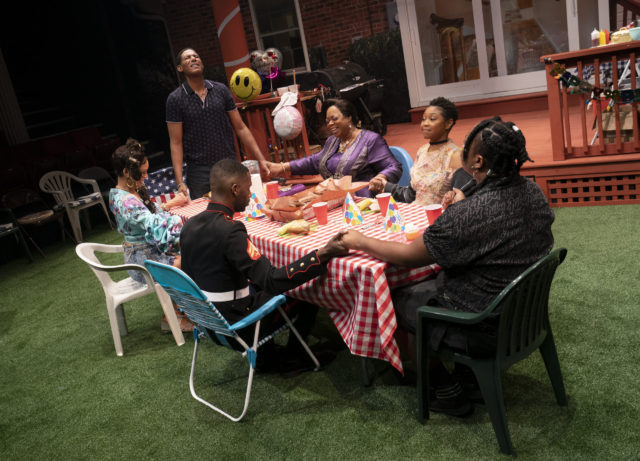
Rev (Billy Eugene Jones) leads a prayer before family and friends partake of barbecue in Fat Ham (photo by Joan Marcus)
A few minutes later, Juicy is visited by the ghost of his father, Pap, dressed in white, eerie smoke drifting around his neck and shoulders. Pap wants his son to avenge his death — and to stop eating candy bars unless he wants to get “the suga,” which runs in the family. Pap orders Juicy to split Rev open: “Make his thighs into hams. His intestines into chitlins. Pickle his feet and boil his head down to a skull! Crisp up his belly and dry out his balls and grind them up into a fine powder. Lay that all out on the table, invite over your nearest and dearest, and feast. And then make me a plate.” Pap also belittles his son’s education choices, studying human resources at the University of Phoenix. “Scam. Who goes to college online to learn how to manage human beings. Them things don’t go,” he scolds.
The potential relationship between Juicy and Opal has a bit of a problem that only the two of them are aware of: They are both gay. Meanwhile, Larry has a dark secret of his own. But the party goes on, as Rev sings Teena Marie and Juicy warbles Radiohead’s “Creep,” a kind of replacement for the “To be or not to be” soliloquy: “I don’t care if it hurts / I wanna have control / I want a perfect body / I want a perfect soul / I want you to notice / When I’m not around / So fuckin’ special / I wish I was special / But I’m a creep / I’m a weirdo / What the hell am I doin’ here? / I don’t belong here.” The lyrics represent what so many young queer Black men experience, not wanting to be made to feel invisible and less than.
Juicy uses charades to tell his uncle he knows what he did: “The play’s the thing / Wherein I’ll catch the conscience of . . . the . . . King. Cook. He is a cook in this play,” he tells the audience. The game is on as Rev and Juicy battle it out.
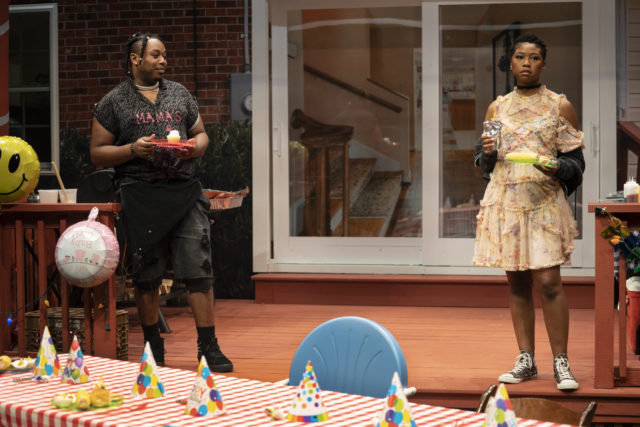
Juicy (Marcel Spears) and Opal (Adrianna Mitchell) are not destined to fall in love in reimagining of Shakespeare’s Hamlet (photo by Joan Marcus)
Fat Ham is outrageously funny, featuring superb over-the-top performances by the ensemble. Spears (Othello, A Midsummer Night’s Dream) has a tender gentleness, a softness, to his every move; dressed in all black (the contemporary costumes are by Dominique Fawn Hill), he would fit right in as Usher in Michael R. Jackson’s A Strange Loop, another “big Black queer” character with a complicated relationship with his family and other people who’s trying to figure out just who he is and what he wants out of life. Human resources is probably not Juicy’s best career path. Perhaps Ijames named him after the Notorious B.I.G. song “Juicy,” in which Biggie Smalls declares, “You know very well / Who you are / Don’t let ’em hold you down / Reach for the stars / You had a goal / But not that many / ’Cause you’re the only one / I’ll give you good and plenty.”
Ijames (White, Kill Move Paradise) interjects Shakespeare at just the right moments, as when, after Larry and Juicy share an intimate moment, the latter turns to the audience and delivers one of the Bard’s masterpieces, the poetic speech that begins “What a piece of work is a man!” But Ijames keenly changes one pronoun, and the meaning of the prose is altered following the scene we just watched,
Stacey Derosier’s lighting keeps things bright and cheery, as does Darrell Grand Moultrie’s choreography on Maruti Evans’s backyard set. Director Saheem Ali (Nollywood Dreams, Merry Wives) ably balances the wackiness with the serious nature of so much of Ijames’s dialogue alongside whimsical references to Ms. Cleo, OnlyFans, and sexy muppets. But it’s not all lighthearted fun.
At one point, Tio, talking about what he is learning from his therapist, explains to Juicy, “He said . . . These cycles of violence are like deep. Engrained. Hell, engineered. Hard to come out of. Like, your Pop went to jail, his Pop went to jail, his Pop went to jail, his Pop went to jail, and what’s before that? Huh? Slavery. It’s inherited trauma. You carrying around your whole family’s trauma, man. And that’s okay. You okay. But you don’t got to let it define you.”
Juicy is determined not to follow in his father’s footsteps, trying to overcome the systemic institutional racism that dooms so many Black men and tears apart families. That’s not exactly the same thing as the handing down of the crown from generation to generation of white men and boys —but it has the potential to become the half-million-dollar crown Biggie was famous for wearing.
